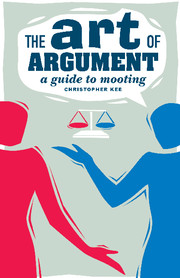Book contents
- Frontmatter
- Contents
- Preface
- Acknowledgments
- Part 1 Making the most of a moot
- 1 Introduction
- 2 You've made the team – what next?
- 3 Being part of a team
- 4 Building an argument
- 5 Written documents
- 6 Oral submissions
- 7 Practice moots
- 8 The competition itself
- 9 After it's all over
- Part 2 References and resources
- Part 3 International moots
- Index
3 - Being part of a team
Published online by Cambridge University Press: 05 June 2012
- Frontmatter
- Contents
- Preface
- Acknowledgments
- Part 1 Making the most of a moot
- 1 Introduction
- 2 You've made the team – what next?
- 3 Being part of a team
- 4 Building an argument
- 5 Written documents
- 6 Oral submissions
- 7 Practice moots
- 8 The competition itself
- 9 After it's all over
- Part 2 References and resources
- Part 3 International moots
- Index
Summary
THE KEYS TO A SUCCESSFUL TEAM
Attitude
The attitude you as an individual bring to working in the team will affect both the way the team functions and the value of your experience. You must have a positive attitude about every member in your team. It is often said that the secret of a successful marriage is to work on it every day; the same is true of a successful team.
Although we leave the analysis of human behaviour to other disciplines such as psychology and psychiatry, lawyers are keen observers. An immediate observation we can make is that no two people are the same. We will all have had different experiences in life, which will lead us to think differently and deal with problems in different ways. Working as part of a team requires you to respect the differences that exist between team members. It can be a difficult and challenging task, particularly when you are teamed with someone you find very annoying. However, it is a skill that will hold you in very good stead throughout your professional career.
There is no doubt that your attitude towards your team-mates will be tested often. Someone will do something (or probably more often not do something) that is a cause of great frustration and annoyance to you. It is during those times that you have to work the hardest on the team relationship.
Identify strengths and weaknesses in the team
The best way to maintain a positive attitude towards everyone in your team is to identify and focus on their respective strengths.
- Type
- Chapter
- Information
- The Art of ArgumentA Guide to Mooting, pp. 13 - 17Publisher: Cambridge University PressPrint publication year: 2007



